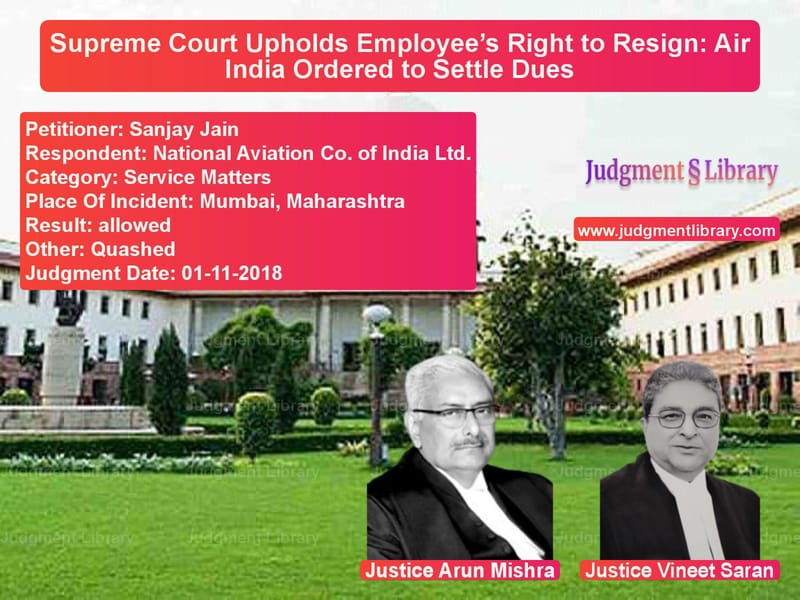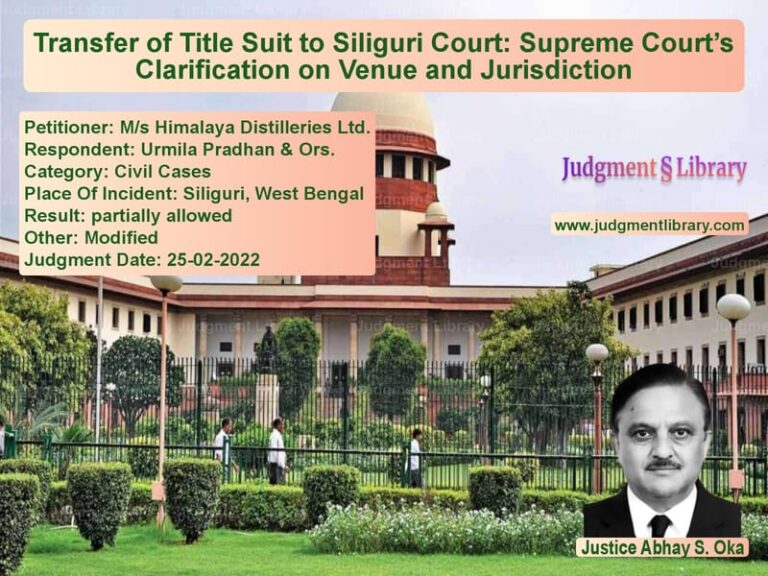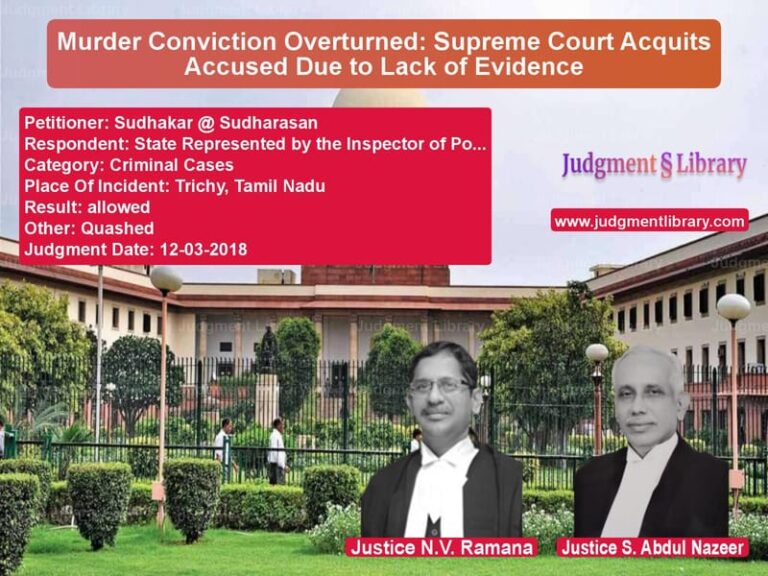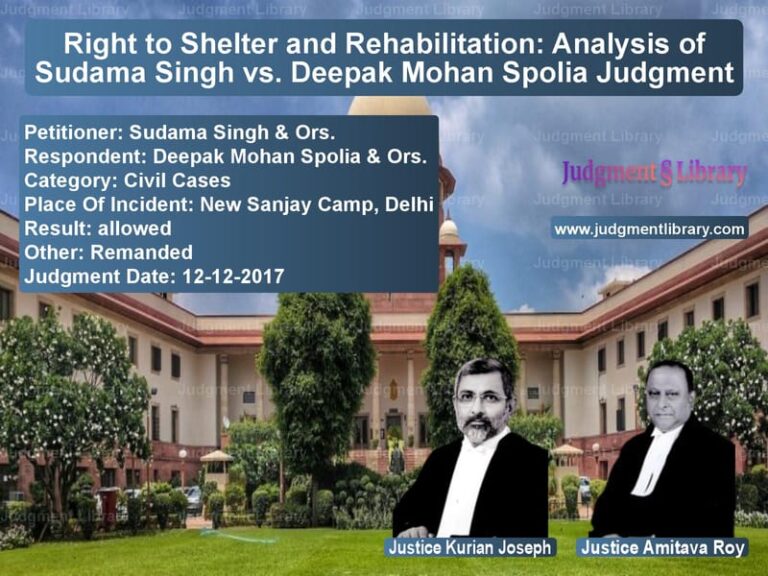Supreme Court Upholds Employee’s Right to Resign: Air India Ordered to Settle Dues
The case of Sanjay Jain vs. National Aviation Co. of India Ltd. revolved around the right of an employee to resign from service without requiring acceptance from the employer. The Supreme Court examined whether the refusal of resignation by Air India Ltd. (now merged with the National Aviation Company of India Ltd.) was legally valid under the company’s Certified Standing Orders.
The dispute arose after Sanjay Jain resigned from Air India on September 1, 2006, serving a notice period of 30 days as required under the company’s Standing Orders. However, Air India refused to accept his resignation, creating complications regarding his employment status and pending financial dues. The Supreme Court ultimately ruled in favor of the appellant, directing Air India to process all outstanding benefits owed to him.
Background of the Case
Sanjay Jain joined Air India Ltd. as an Assistant Aircraft Engineer on September 1, 1992. His employment was governed by the company’s Certified Standing Orders under the Industrial Employment (Standing Orders) Act, 1946. According to these orders, a permanent employee could resign by serving 30 days’ notice or paying salary in lieu of the notice period.
On September 1, 2006, Jain submitted his resignation to Air India, intending it to take effect on October 1, 2006, upon completion of the notice period. However, on September 20, 2006, Air India communicated that it would not accept his resignation, citing internal policies. Despite this, Jain ceased working at Air India after October 1, 2006, and joined Jet Airways on October 3, 2006.
Jain subsequently requested settlement of his financial dues, including provident fund, gratuity, and unpaid wages. Instead of processing his resignation, Air India issued a letter on July 16, 2008, instructing him to report back to duty. This led Jain to approach the Bombay High Court in 2010, challenging Air India’s refusal to accept his resignation. The High Court dismissed his writ petition on September 7, 2010, prompting him to appeal before the Supreme Court.
Arguments by the Petitioner (Sanjay Jain)
- The Certified Standing Orders of Air India clearly stated that resignation becomes effective after the completion of the notice period.
- There was no provision requiring the employer’s acceptance of resignation if the notice period was served.
- His employment with Air India effectively ended on October 1, 2006, and Air India’s attempt to force him back into service two years later was illegal.
- The High Court failed to interpret the Certified Standing Orders correctly, leading to an erroneous judgment.
Arguments by the Respondents (National Aviation Co. of India Ltd.)
- Resignation requires formal acceptance by the employer before it becomes effective.
- The company had discretionary power to reject resignations under certain circumstances.
- Jain’s resignation had not been accepted, and therefore, he remained an employee of Air India.
- Since he did not report for duty after October 1, 2006, his absence was unauthorized.
Supreme Court’s Judgment
The Supreme Court ruled in favor of Sanjay Jain, holding that:
- The Certified Standing Orders clearly allowed an employee to resign upon completion of the 30-day notice period.
- Acceptance of resignation was only necessary if the employee sought to leave before the notice period ended.
- Air India’s refusal to accept the resignation was contrary to the company’s own Standing Orders.
- Jain had lawfully resigned on October 1, 2006, and his employment with Air India had ended from that date.
- All pending dues, including provident fund, gratuity, and unpaid salary, must be settled along with interest at 6% per annum.
The Court stated:
“Since in the Standing Order 18, there is no provision for acceptance of resignation when a 30-day notice is served, the appellant had the right to resign from service. The refusal to accept his resignation was unlawful, and Air India’s actions were not justified.”
Implementation of the Judgment
The Supreme Court directed the following actions:
- Air India must acknowledge Sanjay Jain’s resignation as effective from October 1, 2006.
- All pending dues, including provident fund, gratuity, and other employment benefits, must be paid within three months.
- Interest at the rate of 6% per annum must be applied to the outstanding amounts.
- Air India cannot initiate any further proceedings against Jain regarding his employment status.
Significance of the Judgment
This ruling affirms that employment contracts must be interpreted strictly according to the governing standing orders. Employers cannot arbitrarily refuse resignations when employees comply with legal notice periods.
The judgment sets a strong precedent for cases where employers attempt to withhold resignations unfairly. It upholds an employee’s right to exit a job on legally valid grounds without unnecessary hurdles.
Conclusion
The Supreme Court’s decision in this case protects employee rights and prevents unfair employment practices. By enforcing the Certified Standing Orders of Air India, the Court ensured that employment laws were followed correctly.
With this ruling, employees in similar situations now have legal clarity on their right to resign without requiring employer approval, as long as they comply with notice period requirements.
Petitioner Name: Sanjay Jain.Respondent Name: National Aviation Co. of India Ltd..Judgment By: Justice Arun Mishra, Justice Vineet Saran.Place Of Incident: Mumbai, Maharashtra.Judgment Date: 01-11-2018.
Don’t miss out on the full details! Download the complete judgment in PDF format below and gain valuable insights instantly!
Download Judgment: Sanjay Jain vs National Aviation Co Supreme Court of India Judgment Dated 01-11-2018.pdf
Direct Downlaod Judgment: Direct downlaod this Judgment
See all petitions in Employment Disputes
See all petitions in Termination Cases
See all petitions in Public Sector Employees
See all petitions in Judgment by Arun Mishra
See all petitions in Judgment by Vineet Saran
See all petitions in allowed
See all petitions in Quashed
See all petitions in supreme court of India judgments November 2018
See all petitions in 2018 judgments
See all posts in Service Matters Category
See all allowed petitions in Service Matters Category
See all Dismissed petitions in Service Matters Category
See all partially allowed petitions in Service Matters Category







